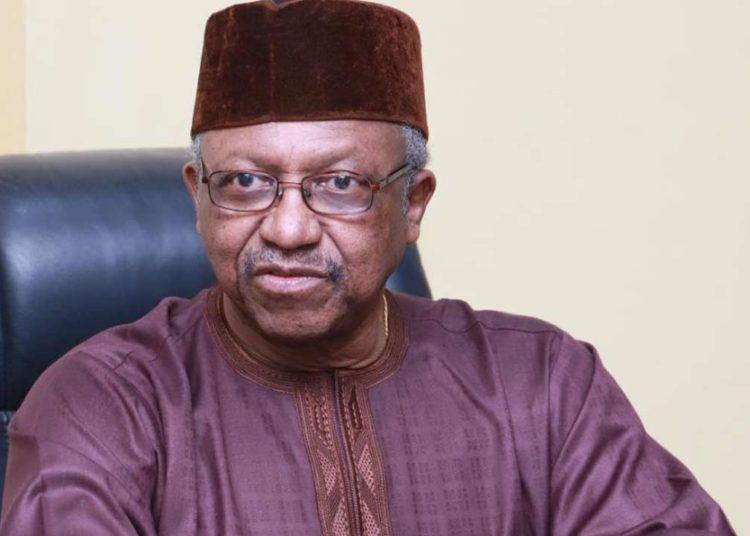Overwrought by the long waiting hours and substandard treatment, Nigerians who enrolled for the National Health Insurance (NHIS) have called on the authorities to sanitise the scheme for better service delivery by the operators. They placed their grievances at the doorsteps of the health maintenance organinsations (HMOs) and the hospitals, which they accused of poor services and insensitivity to their plight.
Globally, health insurance is seen as the main pillar for achieving universal health coverage (UHC), which largely prompted the federal government set up the NHIS, a scheme that has the tendency to enable Nigeria make progress towards achieving UHC for all her citizens. While the NHIS regulates, the HMOs are put in place to ensure that Nigerians who have paid for health insurance packages have access to quality healthcare services at the hospitals (who are the healthcare providers) of their choice.
But a few Nigerians who have health insurance packages have queried the health insurance scheme, in that they are not getting the quality healthcare services that their HMOs promised them, making them have doubts in the scheme. For instance, a banker in Lagos state, Mrs Lydia Okafor, told LEADERSHIP that whenever she visits her hospital, because she has a health insurance package, the hospital would delay her for hours, while attending to others.The banker expressed pain that the hospital will still give her inferior drugs.
“This has continued for so long. Presently, I go to the hospital for a test, and then purchase my drugs from the pharmacy,” she said. Also, a boutique owner in Lagos, Mrs Folashade Akingbade, said it was until she threatened to take legal action against the hospital if anything happens to her daughter, who had been admitted for almost a week without improvement, that they started treating her with the proper medication. Akingbade told LEADERSHIP that her daughter had infection, but the drugs the hospital were using to treat the infection were not effective.
“My daughter’s condition didn’t improve, so I had to call my brother who is a doctor, who then told the doctors to administer another brand of the medications they were giving to my daughter. Within three days of administering the new drugs, my daughter’s condition improved drastically. “I do not know if my HMO told the hospital to give me cheaper brands of drugs or not, but if that is true, then the purpose of health insurance, which is to provide unlimited and quality healthcare services to enrollees, has been forfeited,” she said.
There is no way a private patient and an enrollee can have the same treatment, a doctor, who spoke with LEADERSHIP anonymously, said. He said private patients pay higher, hence the preferential treatment given to them, adding that most HMOs prefer cheaper drugs and treatment for their enrollees. “If we go beyond the stipulated agreement we had with the HMOs, they will not pay us. In fact, most of the time, if we decide to give enrollees, for instance, a malaria drug worth N1,000, meanwhile, the agreement we had with the HMOs was to give malaria treatment worth N500, the HMOs won’t pay the differential,” he explained.
Investigation by LEADERSHIP showed that at the primary healthcare level, the scheme pays N750 per person, per month. If a hospital has, for instance, 100 enrollees, what it gets from the scheme is just N75,000, which may not be enough to treat five persons. Meanwhile, a member of the last governing council of NHIS, Lekan Ewenla, said at the commencement of the health insurance programme in Nigeria, that the concept was designed in such a way that there were two risk takers, the primary providers and the HMOs.
The primary healthcare centre (PHC) is the cornerstone of healthcare services, and because 80 per cent of what take people in and out of hospitals reside at that level, Ewenla said the primary healthcare providers were instituted to be a risk taker and as such 65 per cent of the premium is expected to be paid to them at the beginning of every month. He said the actuary report recommended a minimum of 2,500 enrollees for each primary provider as the benchmark, before they can manage the risk.
“Now that the scheme is paying N750 per person per month, by the time you multiply the N750 by the 2,500 enrollees, you will get N1.8 million plus a fraction. That was meant to be the design of the scheme. The primary providers who are more critical in service provision are expected to have 2,500 enrollees at the commencement of the scheme,” he said. But in reality, the majority of the primary providers didn’t get that recommended volume, and the reason for that is not far-fetched, he said, adding that the volume of primary providers accepted by the NHIS was far more than the volume required. He said, “As of then, there were about six million Nigerians on the NHIS scheme, whereas the primary providers were up to 8,000. If you spread the six million enrollees across the 8,000 primary providers, each provider won’t have up to the recommended 2,500 enrollees. Don’t forget an enrollee has the right to choose his/her hospital.
“There are some providers that have fewer than 500 enrollees, hence the reason for the poor quality of services provided to enrollees. Don’t also forget, the facilities were set up to make profit. For instance, if a provider has less than 100 enrollees and you are paying N750 per person, a single visit by two enrollees can gulp all the funds for that month. So that is the major challenge,” he added. Ewenla, who is also the MD/ CEO, Ultimate Health HMO, and member of the governing council, Nigeria Employers’ Consultative Association (NECA), said HMOs had been discussing this issue with the present leadership of NHIS, while commending the present leadership of NHIS for their strong determination to address this issue.
“Part of what we recommended was that the NHIS should go back to the field and reassess the primary providers, and whoever does not meet up with the accreditation of NHIS service providers should be removed from the list. NHIS must, as a matter of fact, reduce the over 8,000 primary providers, to like 3,000, for meaningful impact,” Ewenla said. To grow the volume of enrollees, Ewenla said that the issue is being addressed by the Ehanire leadership of NHIS. “The law that sets out the scheme is being reviewed by the 9th National Assembly and the law to make health insurance compulsory for all Nigerians will soon be passed into law.
The law is awaiting the endorsement of the president of Nigeria; once that is done, health insurance will be mandatory for all Nigerians. The present leadership of NHIS is working assiduously to put in place the framework that will ensure and enhance compliance, in preparation for the passage of the law,” he stated. Meanwhile, the executive secretary of NHIS, Prof. Mohammed Sambo, during his visit to LEADERSHIP in July 2020, said that 12 million Nigerians were enrolled in NHIS. In an exclusive interview with LEADERSHIP, the general manager, standards and quality assurance, NHIS, Dr. Yakubu Agada, said the Scheme monitors the HMOs and health facilities, saying the performance of HMOs is tied to their reaccreditation which is done every two years.
“The HMOs present a letter of non-indebtedness for them to be reaccredited. This is to ensure that the money they are given was used for the right purpose,” he explained. However, Agada said the Scheme had been decentralised, and data are being collected from States Social Health Insurance Agencies and other programmes like the private health insurance, including the Group, Individual and Family Social Health Insurance Programme (GIFSHIP) saying the figures are being collected and will soon be disbursed. Noting that the NHIS law at inception and till date is still non-mandatory, Agada called on the government to sign the law that will make health insurance mandatory in the country so that every Nigerian, irrespective of what they do or where they work, will be mandated by the federal government to have a health insurance policy, saying that way “we won’t have people collapsing on the way as they will be able to access quality healthcare.” On the minimum standard for a health facility to be accredited by the NHIS, Agada said, “We have what we call entry requirement to participate in NHIS.
In accreditation, we look at personnel which talks about: do you have doctors, do you have nurses, how many are they, what equipment do you have to run this programme? We take all these into consideration. “We also have what we call the environment, we look at the environment, we look at the structures, are they appropriate, we look at how do they keep their books, bank details, do they have a board, are they registered with the Corporate Affairs Commission (CAC), do they have registration with the State Ministry of Health.
“All these we do to make sure that the hospitals are in good standing. We ensure that the hospitals are properly registered with other agents of government and then we even go physically to see if they actually have doctors to ensure that we don’t bring quacks into the system and when we notice this, we are able to quickly intervene. “Apart from this, every two years, we go to the hospitals to see if what they told us, they are maintaining them. The NHIS state offices go round to check.”
Also, on complaint about substandard drugs being given to NHIS enrollees by health facilities, the general manager, standards and quality assurance at NHIS, Dr. Agada, said the issue of fake and substandard drugs is not an NHIS matter, but a general problem in the society. He however said that NHIS was doing an intervention to make sure it gets the right drugs for its enrollees. “There is nothing like substandard drugs under NHIS; it is criminal under medical practice to give substandard drugs. It is not an NHIS issue, it is a general problem in the society. We are ensuring that the drugs we are giving to our enrollees are of quality,” he explained.
Explaining further, Agada noted that there is the issue of generic and branded drugs. He said, “That is a very interesting issue. Our society has been in such a way that doctors and other prescribers will tell a patient that this one because it is coming from this company, is not good; it is unethical as a doctor. As prescribers and as doctors, you have the right to prescribe only generic drugs and when the patient goes to the pharmacy, the pharmacy will give the one that is available.
“Now there are certain cosmetics or high branded drugs that are expensive; for example, you have paracetamol, you have Panadol; Panadol is a brand of paracetamol. Emzo produces paracetamol, paracetamol could be N10 and Panadol, which is by another company, could be selling at N50 or even N100. This is a social security system, we cannot go and pay that N100; we will rather pay the N10 for paracetamol and have enough for more people, instead of buying Panadol for one person and not having for the remaining nine people; that is what has been happening.
“We have local manufacturers; should we not be promoting them, should we not be building the local manufacturing so that we become self-sustaining and export to others? if we continue to feed on these foreign cosmetic things, we will never make progress as a country.” He, however, added that such complaints had been lodged with the agency and that the ones it was able to verify, it will sanction the hospitals and HMOs involved.
“I am not going to say it doesn’t exist, even people who are paying out of pocket, sometimes they see this. It may not be because they are under NHIS. Whenever we hear reports of such, the enforcement department of the Scheme moves into action,” he said. Agada, meanwhile, disclosed that the NHIS had come up with a drug supply initiative, which he describes as a game changer. “When it comes on board, what we intend to do is engage the drug manufacturers directly,” he said, adding that the drugs will be labelled or branded for NHIS. According to him, the Scheme was working with NAFDAC, the Federal Ministry of Health, Ministry of Finance and Budget, Trade and Investment, customs and others to ensure the quality of the products that are going to come out.
“They will brand them for NHIS and we will monitor it to the hospitals to make sure the hospitals are also paying the manufacturers. That will also help us to ensure that the quality of drugs being dispensed to the enrollees are of good quality and available and accessible,” he said. Agada hinted that the final approval for the NHIS drug supply initiative is with the minister of health.
“We have done everything; the guideline is in the Federal Ministry of Health. If you are to prevail on them today, by first quarter of next year, you will see NHIS branded drugs. We have finished everything; it’s a big committee that had all the components I mentioned. NHIS is not doing it alone; we have an implementing committee which involves the National Institute for Pharmaceutical Research and Development (NIPRD), NAFDAC, Federal Ministry of Health, and Ministry of Finance.”
He further revealed that in a move to alleviate the plight of cancer patients in the country and restore hope to them, the NHIS had signed an MOU with Roche Products Nigeria Limited on Cancer Care Reimbursement initiative. According to Agada, the partnership is to bring down the cost of cancer drugs. “We are starting with oncology, that is cancer; we have been able to get Roche to write off 50 per cent of the cost of cancer drugs for NHIS enrollees; the drug will come directly from Roche,” he said.





